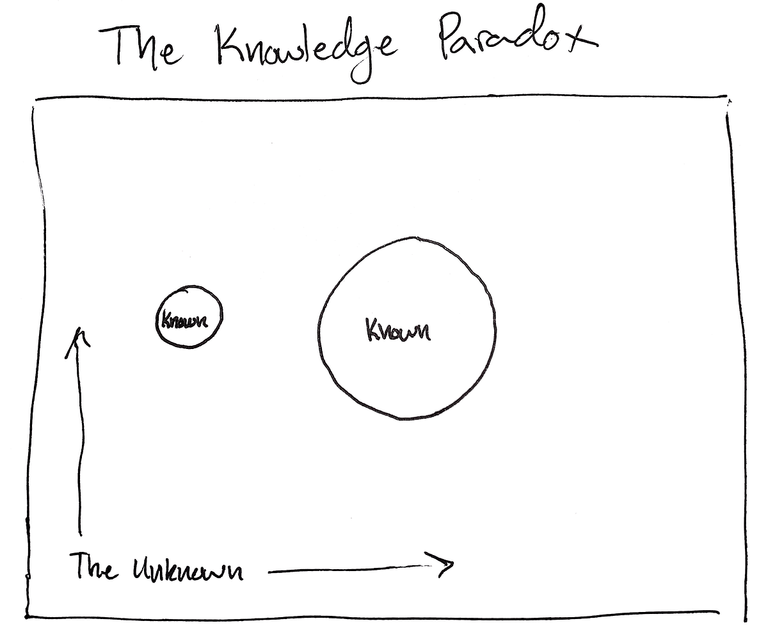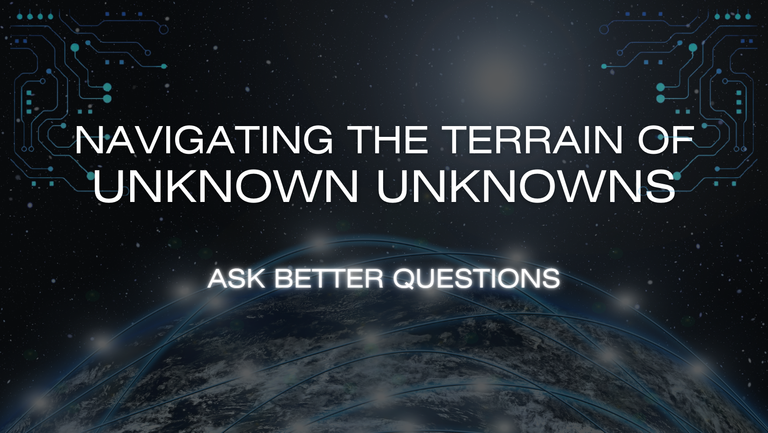In an era increasingly defined by its unpredictability, the concept of "unknown unknowns" has emerged as a central theme in discussions about the future. This term, which denotes factors and challenges that we are not only unaware of but also cannot foresee, presents a significant obstacle to traditional problem-solving methods.
In the face of new challenges, our thinking must evolve from a focus on seeking predefined answers to a more dynamic approach of identifying the right questions to ask.
Devote researchers and lifelong students are well aware of the knowledge paradox: the more we learn, the more we realize how little we know...

Therefore this shift is crucial for unlocking human potential, navigating societal shifts, and fostering innovation in uncertain times.
This article further explores the concept of "Unknown Unknowns," provides tips on asking better questions, and highlights the importance of the shift from finding answers to identifying proper questions.

Embracing the Unknown
The first step in this transformative process is embracing the unknown. This involves acknowledging that, despite our best efforts, we cannot predict every challenge that will emerge. Instead of viewing this unpredictability as a hindrance, we should see it as an opportunity. It is a chance to develop flexibility and resilience, qualities that are essential for individuals and societies aiming to thrive in a changing world.
The Right Questions as Keys to Innovation
Asking the right questions becomes a powerful tool in this context. Questions open the door to exploration and discovery, allowing us to venture beyond conventional wisdom and established solutions. They encourage us to look at problems from different perspectives and to consider a wider range of possibilities. This is particularly relevant in the realm of innovation, where the ability to question the status quo is often the first step toward developing groundbreaking ideas and technologies.
10 Principles for Asking Better Questions
1. Embrace Curiosity: Cultivate a genuine curiosity about the world around you. Approach each situation with a mindset that there is always something new to learn.
2. Think Broadly, Then Narrow Down: Start with broad questions to open up the discussion and explore various aspects of the topic. Gradually narrow your focus to hone in on specific areas of interest or concern.
3. Ask Open-Ended Questions: Frame your questions to encourage detailed responses rather than simple yes or no answers. Open-ended questions foster deeper thinking and exploration.
4. Seek to Understand, Not Just to Be Understood: Ask questions that show you are trying to understand the other person’s perspective or the intricacies of a problem, rather than just conveying your own thoughts or solutions.
5. Question Assumptions: Regularly challenge assumptions, including your own. Asking "What if?" or "Why do we assume that?" can uncover new insights and lead to innovative solutions.
6. Be Comfortable with Silence: After asking a question, give people time to think before they respond. Silence can be powerful, allowing deeper reflection and more thoughtful answers.
7. Use the 5 Whys Technique: When trying to get to the root of a problem, ask "Why?" five times, or until you uncover the underlying issue. This technique can help peel back the layers of symptoms to identify the core of a problem.
8. Encourage Diversity of Thought: Seek out perspectives from individuals with different backgrounds, experiences, and expertise. Diverse viewpoints can lead to richer, more comprehensive discussions.
9. Reflect on the Answers: After receiving answers, take the time to reflect on what you’ve learned. Consider how the new insights impact your understanding of the topic or problem.
10. Foster a Safe Environment for Questions: Create an atmosphere where asking questions is encouraged and valued. This encourages others to share their thoughts and questions, leading to a more open and insightful dialogue.
Human Potential and Societal Shifts
The shift toward questioning also has profound implications for human potential and societal development. By fostering a culture that values inquiry and open-mindedness, we can create environments that encourage individuals to explore their capabilities fully. This approach can help to unlock creativity and drive progress, enabling people to contribute more effectively to their communities and the broader society.
Moreover, as societies confront the challenges posed by unknown unknowns, the ability to adapt and evolve becomes crucial. The questions we ask can guide us in reshaping our institutions, policies, and social norms to better reflect the realities of our changing world. This, in turn, can lead to more inclusive, resilient, and sustainable communities.
A New Paradigm for the Future
The transition from seeking answers to asking the right questions represents more than just a strategic shift. It signifies a fundamental change in how we understand and interact with the world around us.
In the face of uncertainty, our capacity to question becomes our most valuable asset, guiding us through the uncharted territories of the future.
As we continue to explore the intersection of human potential, societal shifts, and innovation, it is clear that our ability to navigate the landscape of unknown unknowns will define the trajectory of our collective future. By embracing the power of inquiry, we can unlock new possibilities, foster greater resilience, and build a world that is prepared to face the challenges of tomorrow.
The journey into the unknown is not a path to be feared but an adventure to be embraced. By shifting our focus from finding the answers to identifying the right questions, we equip ourselves with the tools necessary for success in an unpredictable world. As futurists, innovators, and members of a global society, our task is to lead the way, illuminating the path forward with the light of inquiry and the spirit of exploration.


So many in the world are being pushed and pulled here and there, in the ever more rapidly changing currents of transformation of our world. This kind of thinking is so key to finding balance and being empowered to create our desires freely and successfully.
To quote a particularly adept voice in this field:
"There is no need to be afraid of the unknown - all you will ever find in the unknown is more of yourself."
that quote is powerful!
Congratulations @ashleymosaic! You have completed the following achievement on the Hive blockchain And have been rewarded with New badge(s)
Your next target is to reach 3000 upvotes.
You can view your badges on your board and compare yourself to others in the Ranking
If you no longer want to receive notifications, reply to this comment with the word
STOPCheck out our last posts: